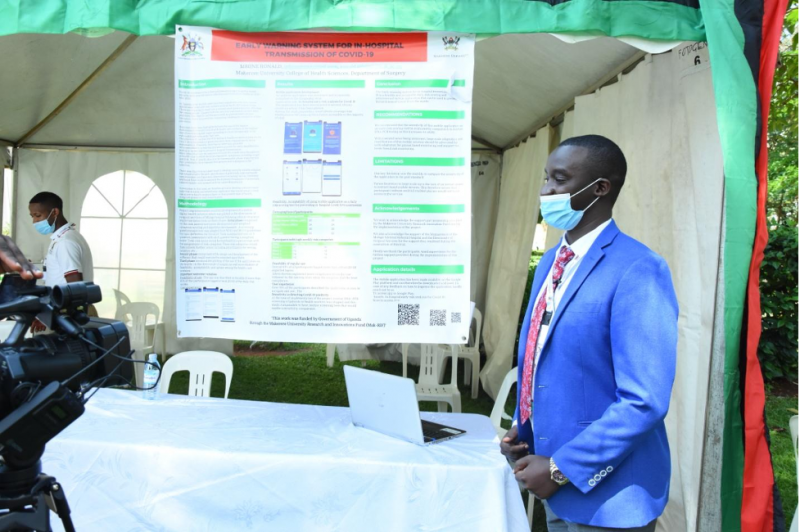
A Makerere University researcher has developed a mobile phone Application that can assess the COVID-19 risk for in-hospital transmission. Dr. Ronald Mbiine, the researcher, says the smartphone-based App works by assigning a daily risk score to health workers based on their present state of health, symptoms and contact history. The early warning assessment allows for interventions, including testing and treatment.

The innovation, a product of research funded by the Government of Uganda through the Makerere University Research and Innovations Fund (Mak-RIF), will help the country deal with a new surge in COVID cases, with in-hospital transmission among the main avenues driving the spread of Corona Virus Disease.
COVID-19 has presented an unprecedented challenge to the healthcare systems worldwide due to its complex transmission patterns. Current evidence indicates that hospitals have one of the highest rates for COVID-19 transmission, with health workers at the highest risk of contracting the disease, as well as easily spreading it to the vulnerable patients in their care.
In Uganda, the government stopped the practice of routine DNA-PCR testing of health workers/patients due to unsustainability, among other challenges. This created a huge gap, with lack of alternative practice for early identification and testing, which plays a crucial role in preventing hospital transmission.
Additionally, the researchers noted that the current practice of relying on respiratory symptoms such as cough and difficulty in breathing (DIB) is untimely and allows medical and hospital workers to expose their colleagues to infection.
The new innovation helps to directly respond to the need for a scalable solution that allows for early identification of potentially infected healthcare providers.
Making of the App
The research involved participants from different backgrounds: junior and senior officers, nurses and surgeons. The researchers first developed a digital health solution, which was piloted at the Directorate of Surgical Services, Mulago National Referral Hospital.

The Principal Investigator, Dr. Ronald Mbiine, says he is optimistic that the new innovation could be adopted by other African countries in the fight against COVID-19
They then went through three phases for development of the application. The first phase dealt with the COVID-19 risk assessment, score development, weighted symptom and a scoring algorithm. The researchers then used the total risk score to inform further action that can prevent transmission of COVID-19 as testing isolation.
The second phase included actual design and development of the software that can execute the actual work of assessing risks of transmission.
The third phase piloted the use of the smartphone-based application in wards at the Directorate of Surgical Services. The researchers also tested to establish whether the application was feasible or acceptable to be adopted by healthcare workers.
The new phone application recorded a 69 per cent score for logins. This was 20 to 30 times more than the expected logins. The study also revealed that intern doctors were more compliant to smartphone-based applications, followed by the nursing team, while the surgeons ranked last.
While assessing the user experience, 93 per cent of the participants described the application as easy to navigate and use. However, one limitation to the study was the absence of sensitivity comparison, which researchers said could not be done due to the government decision to stop routine DNA-PCR screening of patients or health workers.
“Whereas adaptation and modification of the mobile App-based solution is a good step in the fight against COVID-19, we fear that this may be slowed down by a lack of universal access to the internet in Uganda, where the subscription rate stands at 45 per cent of the population,” said Dr. Mbiine.
The study recommends that additional tests on the sensitivity of this mobile application as an early risk scoring tool be evaluated by comparison to routine COVID-19 testing, to increase its utility.
With 15.9% of inpatients receiving invasive mechanical ventilation, 19.4% of inpatients treated in an ICU, and 20.3% in-hospital mortality among inpatients with COVID-19, this study found that COVID-19 may lead to severe clinical outcomes, including death, among a high percentage of patients. The in-hospital mortality rate was highest among patients from the Northeast.
The median hospital LOS [1] was 6 days, with an IQR of 3 to 10 days. Severe acute complications, including acute respiratory failure, sepsis, acute kidney failure, and metabolic abnormalities, were common among inpatients. Patients aged 65 years and older disproportionally accounted for more than 75% of all in-hospital deaths. Use of statins, ACE inhibitors, calcium channel blockers, and vitamin C or D supplements were associated with significantly decreased odds of in-hospital mortality among adult inpatients with COVID-19 compared with those without such medication use. The combination use of azithromycin and hydroxychloroquine was associated with increased odds of in-hospital mortality compared with those who received neither drug.
As the fight against COVID-19 looks far from over, with surging cases in Uganda and around the globe, minimizing in-hospital transmission will play a key role in flattening the curve again. The current challenge for early isolation and containment, especially during significant ongoing community transmission means treatment alone cannot be the solution. New innovations, especially in digital health like the In-Hospital Early Risk analysis could prove vital in the fight to eliminate Coronavirus.
By George Bush Ocen




